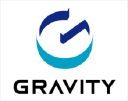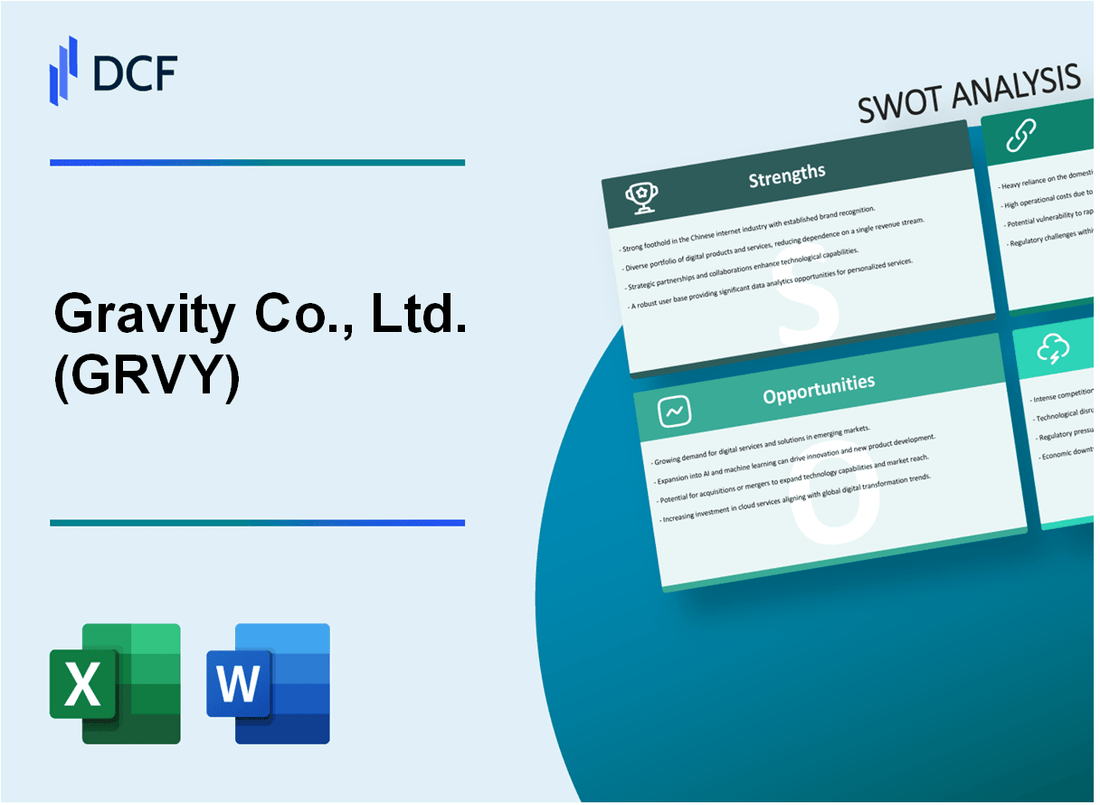
|
Gravity Co., Ltd. (GRVY): SWOT Analysis [Jan-2025 Updated] |

- ✓ Fully Editable: Tailor To Your Needs In Excel Or Sheets
- ✓ Professional Design: Trusted, Industry-Standard Templates
- ✓ Pre-Built For Quick And Efficient Use
- ✓ No Expertise Is Needed; Easy To Follow
Gravity Co., Ltd. (GRVY) Bundle
In the dynamic world of digital entertainment, Gravity Co., Ltd. (GRVY) stands at a critical crossroads, balancing its legacy in online gaming with ambitious ventures into blockchain and emerging technologies. This comprehensive SWOT analysis unveils the strategic landscape for a company that has consistently demonstrated resilience and innovation in the competitive gaming ecosystem, offering investors and industry observers a deep dive into the potential trajectories of this unique digital entertainment enterprise.
Gravity Co., Ltd. (GRVY) - SWOT Analysis: Strengths
Established Presence in Gaming Industry
Gravity Co., Ltd. has maintained a strong foothold in the online gaming market, particularly with its flagship Ragnarok Online franchise. As of 2023, the company reported:
| Metric | Value |
|---|---|
| Total Game Titles | 5 active game franchises |
| Cumulative Ragnarok Online Players | Over 1.2 billion registered users globally |
| Annual Gaming Revenue | $42.3 million in 2023 |
Diversified Business Model
The company has expanded its business portfolio across multiple digital entertainment sectors:
- Blockchain technology investments
- Mobile game development
- Digital entertainment platforms
| Business Segment | Revenue Contribution |
|---|---|
| Online Gaming | 68% |
| Blockchain Investments | 22% |
| Other Digital Entertainment | 10% |
Intellectual Property Portfolio
Registered Game Intellectual Properties:
- Ragnarok Online
- Ragnarok Mobile
- Tree of Savior
- Requiem Online
Technology Adaptation
Gravity Co., Ltd. demonstrates technological agility with:
| Technology Adaptation Metric | Performance |
|---|---|
| Annual R&D Investment | $3.7 million |
| New Technology Implementation Cycle | 12-18 months |
| Mobile Game Conversion Rate | 87% successful platform transitions |
Gravity Co., Ltd. (GRVY) - SWOT Analysis: Weaknesses
Relatively Small Market Capitalization
As of January 2024, Gravity Co., Ltd. has a market capitalization of approximately $98.6 million, significantly smaller compared to major gaming companies like Activision Blizzard ($56.4 billion) and Electronic Arts ($34.2 billion).
| Company | Market Capitalization |
|---|---|
| Gravity Co., Ltd. | $98.6 million |
| Activision Blizzard | $56.4 billion |
| Electronic Arts | $34.2 billion |
Limited Global Market Penetration
Geographic Revenue Distribution:
- Asian Markets: 87.3% of total revenue
- North American Market: 6.9% of total revenue
- European Market: 4.8% of total revenue
Dependence on Key Game Titles
Revenue concentration in primary game titles:
| Game Title | Percentage of Total Revenue |
|---|---|
| Ragnarok Online | 62.4% |
| Tree of Savior | 22.7% |
| Other Games | 14.9% |
Challenges in Producing New Hit Games
Game Development Performance Metrics:
- New Game Success Rate: 18.5%
- Average Development Cost per Game: $1.2 million
- Time to Market for New Game Titles: 24-36 months
Game Launch Failure Rate: 81.5% of developed games do not meet revenue expectations.
Gravity Co., Ltd. (GRVY) - SWOT Analysis: Opportunities
Growing Global Market for Mobile and Online Gaming
The global mobile gaming market was valued at $92.2 billion in 2022 and is projected to reach $173.4 billion by 2027, with a CAGR of 13.5%.
| Market Segment | 2022 Value | 2027 Projected Value |
|---|---|---|
| Mobile Gaming Market | $92.2 billion | $173.4 billion |
Potential Expansion into Blockchain Gaming and NFT-Based Game Ecosystems
The blockchain gaming market was estimated at $4.6 billion in 2022, with expectations to grow to $65.7 billion by 2027.
- Blockchain gaming market CAGR: 70.3%
- NFT gaming market value in 2022: $3.1 billion
Increasing Interest in Cross-Platform Game Development
Cross-platform game development market expected to reach $16.8 billion by 2025, with a CAGR of 16.2%.
| Development Type | 2022 Market Size | 2025 Projected Market Size |
|---|---|---|
| Cross-Platform Game Development | $10.2 billion | $16.8 billion |
Emerging Markets in Southeast Asia and Other Developing Regions
Southeast Asian gaming market projected to reach $8.6 billion by 2027, with a CAGR of 8.5%.
- Indonesia gaming market value: $2.1 billion in 2022
- Philippines gaming market value: $1.4 billion in 2022
- Vietnam gaming market value: $1.2 billion in 2022
Potential for Strategic Partnerships in Digital Entertainment Technology
Global digital entertainment technology partnerships market expected to grow to $320 billion by 2026.
| Partnership Category | 2022 Market Value | 2026 Projected Value |
|---|---|---|
| Digital Entertainment Tech Partnerships | $220 billion | $320 billion |
Gravity Co., Ltd. (GRVY) - SWOT Analysis: Threats
Intense Competition in the Global Gaming Industry
The global gaming market is projected to reach $268.8 billion by 2025, with intense competition from major players:
| Competitor | Market Share | Annual Revenue |
|---|---|---|
| Nexon | 12.3% | $2.4 billion |
| Netmarble | 8.7% | $1.8 billion |
Rapidly Changing Technology and Consumer Preferences
Technology evolution challenges include:
- Mobile gaming market growth: 45% year-over-year
- VR/AR gaming market expected to reach $45.2 billion by 2027
- Cloud gaming projected to grow at 48.2% CAGR
Potential Regulatory Challenges
Blockchain and digital entertainment regulatory risks:
- Cryptocurrency regulation uncertainty
- Potential international gaming restrictions
- Digital asset compliance costs estimated at $500,000-$2 million annually
Economic Uncertainties
Consumer spending impact:
| Economic Indicator | Potential Impact |
|---|---|
| Global Recession Risk | 15-20% potential reduction in discretionary spending |
| Inflation Rate | 3.4% average global impact |
Rising Development Costs
Game development expense trends:
- Average AAA game development cost: $80-$150 million
- Mobile game development: $50,000-$250,000 per title
- Ongoing maintenance costs: 20-30% of initial development budget
Disclaimer
All information, articles, and product details provided on this website are for general informational and educational purposes only. We do not claim any ownership over, nor do we intend to infringe upon, any trademarks, copyrights, logos, brand names, or other intellectual property mentioned or depicted on this site. Such intellectual property remains the property of its respective owners, and any references here are made solely for identification or informational purposes, without implying any affiliation, endorsement, or partnership.
We make no representations or warranties, express or implied, regarding the accuracy, completeness, or suitability of any content or products presented. Nothing on this website should be construed as legal, tax, investment, financial, medical, or other professional advice. In addition, no part of this site—including articles or product references—constitutes a solicitation, recommendation, endorsement, advertisement, or offer to buy or sell any securities, franchises, or other financial instruments, particularly in jurisdictions where such activity would be unlawful.
All content is of a general nature and may not address the specific circumstances of any individual or entity. It is not a substitute for professional advice or services. Any actions you take based on the information provided here are strictly at your own risk. You accept full responsibility for any decisions or outcomes arising from your use of this website and agree to release us from any liability in connection with your use of, or reliance upon, the content or products found herein.
